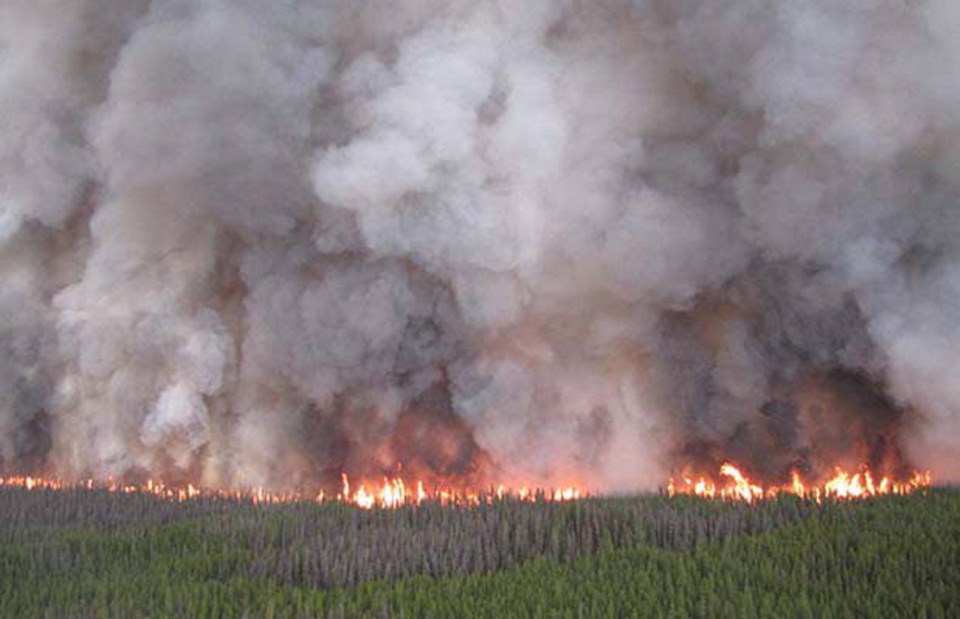The B.C. Forest Appeals Commission recently ordered a Cache Creek resident to pay $500,000 to cover the costs of fighting the 2012 Pavilion Lake wildfire.
Brian Cecil Parke was deemed to have failed to contain a controlled fire on his property that he ignited in April that year. The fire spread to an estimated 140 hectares near Kamloops.
In 2011, the B.C. Ministry of Forests ordered a Cariboo-area man to pay fire-control costs of $861,356.06 after a campfire he allegedly built on his land sparked a fire that spread to Crown land. He appealed, but agreed to a settlement in 2015.
According to the B.C. Wildfire Service, humans have caused an average of 40 per cent of fires over the past 10 years. They caused more than 400 of last year’s wildfires and almost three-quarters of the 12 fire starts reported in the first week of April this year.
Many wildfires start as campfires and as larger fires such as burn barrels, pile burning and large-scale industrial burning. Smoking, electrical fires and structural or vehicle fires that spread are other common culprits.
Under B.C.’s Wildfire Act and Regulation, the government can recover the cost of fighting wildfires and damages for destruction of timber and other natural resources from people and companies that cause the fires or allow them to spread. In addition, the province issues fines for wildfire-related violations. Lighting a fire against regulations or restrictions nets a fine of $1,150. Failing to comply with a fire-control order is $575. Failing to report a fire means a penalty of $383 to $575.
Fighting wildfires has cost the B.C. government well over $2 billion in the past 12 years. Significantly less than one per cent of that has been recovered.
The legislation and fines pertain only to fires that can be linked to human causes — the commission or omission of activities that lead directly to fire starts.
But more complex, less-direct human causes of wildfires are harder to assign fines and penalties to. These causes include the diverse actions undertaken over decades, for example, by communities and industries, which also prime the conditions to turn a wayward spark, ember or cigarette butt into a conflagration. Holding individuals or organizations accountable for humanity’s contributions to large-scale “natural” disasters might be an impossible task.
Most of B.C.’s forests evolved over millions of years to accommodate natural disturbance. Our forests need fire and insects to open stands to allow light to penetrate to the forest floor, and start the process of regeneration and renewal. Thanks to these disturbances, bygone forests were diverse. Young stands grew next to old growth. Patches of pine overtook aspen and poplar. Later-succession species shaded out pine stands.
The diversity protected the forests. It meant no one insect outbreak or fire could sweep across the landscape without running into less-insect-friendly or less-flammable tree species. Nature provided its own fire and bug breaks.
But decades of systematic fire suppression and species-targeted replanting changed B.C.’s forests. Vast tracts of pine forest replaced mixed forest and matured into tasty buffets for mountain pine beetles. The beetles swept through and left dead and dying trees across 14 million hectares. Some trees were harvested, but most remain on the landscape, fuel for fires.
Research published by Natural Resources Canada in 2008 showed that warming winters during recent decades removed the usual cold-weather checks on the beetle’s survival and range. Those shifts in weather patterns have been tied to climate change, to which, increasing evidence shows, humans have contributed significantly.
Add to that prolonged and repeated droughts. A recent study by NASA demonstrates that human-generated greenhouse gases and atmospheric particles were influencing global drought patterns as early as 100 years ago. Add a weakening jet stream — again a result of climate change. A weak jet stream means, for example, that heat waves with little rain stall over regions for weeks on end, instead of being hustled along eastward by the high-atmosphere winds.
Heat and drought dries soils and vegetation, leading to prime fire conditions. It also stresses trees. Stressed trees are less able to counter disease and insect attacks.
And so the cycle continues.
And who will the province hold accountable for that?



